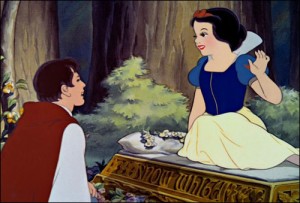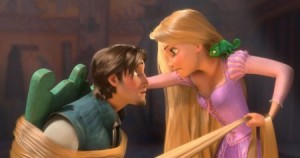“I kissed you like the prince, and now you’re all better!”
I was sick a few weeks ago, and my three-year-old son tried to make me all better with a kiss. I was, of course, touched that he wanted me to feel better, but more amazed that he really believed that he could do it. He sincerely thought that, just like in the Disney movies he had seen, he could heal the person he loved with nothing more than a kiss.
Now, your thoughts at this point probably fall between two extremes: those who swoon and think, “Oh! That is so sweet!” or, those who are horrified that I even let my child watch TV in the first place. If the former, get your head out of the clouds, because I actually want to have a real, adult conversation about princess movies. If the latter, read first, judge later. If my children don’t turn out like you think they should, you can point to this moment and blame me all you want. Right now I want to address this question: In striving to live and teach our children the Catholic faith, are the classic Disney fairy tale movies good for our children and for us to watch, or not?
The Walt Disney Company has produced a wide range of films, but are perhaps most noted for their animated features. Marketed to a young audience, there are concerns that arise as to the effects the movies have on their impressionable viewers. I’ve had discussions with countless people over the years about the flaws in these most popular Disney features. The idealism of romance, the historical inaccuracies, racism, distortion of body image, or passive role of women are just a few of the concerns I’ve heard and read. I do not mean here to dismiss those observations or concerns that go along with them. There are many aspects of these stories that are flawed, and that can be interpreted as hurtful. The thing that bothers me though, is that if that’s the only side of the story, then why would these movies be so popular? So timeless? Why would parents ever show them to their children? Why would I watch them, myself?
I think Disney can be redeemed, especially when viewing their most popular feature animations in light of Catholic teachings on love, chastity, and the Paschal Mystery. Here are some of the things that I think we need to reconsider about these classic stories, which can make them important teaching tools for our children, and enlightening for ourselves as well.
The Triumph of Virtue
There is a villain in every story. Each is depicted in a way that points out the villian’s flaw, and demonstrates how virtue can overcome it. Gaston’s arrogance and pride are defeated by the Beast’s humility and willingness to change. Cinderella’s ability to find joy though living an impoverished life wins out over her step-mother’s and sisters’ greed. Simba’s courage in facing the consequences of his actions overcomes Scar’s cowardice.
If it couldn’t be even more obvious, let’s quote one of the fairies of Sleeping Beauty, who, when Prince Phillip must fight Malificent in the form of a dragon, tells him, “Arm thyself with this enchanted shield of virtue and this mighty sword of truth, for these weapons will triumph over evil.” Does that sound familiar? Maybe give Ephesians, chapter 6 a read. Here we have a spiritual truth, presented in a fairy tale: it is not weapons which conquer evil, but virtue and truth. It doesn’t get much better than that.
We can clearly see the triumph of virtue in these movies. It might be cliché, and it might be an oversimplification of the stories, but it sure can be helpful for explaining to a child that sometimes we have to be nice and share, just like the Beast learned how to be nice and share, or that we don’t want to be vain like the queen in Snow White, but humble and hard working like the dwarves. And hey, don’t we all need a reminder sometimes that good, in the end will defeat evil? Don’t we need a reminder sometimes that the ultimate good, the love of God, has won the battle for us? I know I do.
The Beauty of Romantic Love
Disney movies have been said to provide an unrealistic and idealistic view of romance and relationships, and I think that criticism is justified. Everyone knows that relationships in real life are not dominated by the romance seen in the culminations of these classic stories. Not every man is a handsome, wealthy prince and not every woman is a beautiful princess with perfect hair. This is important to teach children as they grow and important to remind ourselves, even in our marriages, that not every love story is coated in grand gestures and accompanied by an epic soundtrack playing in the background.
Love as eros, love as desire, though, far from being inherently wrong, is a gift of God. Karol Wojtyla writes that, “Desire too belongs to the very essence of the love which springs up between man and woman.” Romantic love is a great gift, insofar as it is directed towards agape, true and sacrificial love for the other. Romance, attraction, and desire all point us towards the union of persons, which reflects the love of God. Of course, we must be sure to point out that love as desire is not an end in itself, but is meant to point us towards a higher, and greater love. That does not mean, though, that there is anything inherently superficial or unholy about swooning over Aladdin and Jasmine’s carpet ride. It can simply be the first step on a road which leads to my next point.
Sacrificial Love
Disney’s “Princess Movies” are often criticized for putting too much emphasis on the romance and whimsy of their endings. There is the sense that all is not well until the prince and princess ride off into the sunset and live happily ever after. There is a concern that the children viewing these movies will idealize love, and later be disappointed in their real life relationships. This concern is real, and it is one that the Church holds as well. While we can speak to the holiness of romantic love, it is only a good insofar as it is an expression of true, self giving love.
The danger of true love being overshadowed by emotion, drama, and fantasy is a real one, but, while the classic happy ending is always present in these stories, there is also an element of sacrificial love behind those endings. There is the cross before the resurrection. There is the willingness of Prince Phillip to face a dragon and death for the sake of Aurora. There are Flynn Rider and Rapunzel, who are simultaneously willing to give up their lives for the sake of the other. There is King Triton, who gives his life and power over to Ursula for the sake of saving his daughter, even though Ariel herself is to blame for all the chaos in the story. There is the free choice of Pocahontas to lay down her life to save John Smith, and the recognition of the Beast that love is not to possess, which prompts him to free Belle. Each of these acts, among others, is an example of sacrificial love to which we can give a name and a story. The kiss that heals all wounds, the ride into the sunset, the happily ever after, are all the fruits of sacrifice. How can we not see the reflection of Jesus in this? The entire mystery of Christianity revolves around the sacrificial love of Christ for the world, which results resurrection and the conquering of death.
The cynical side of each of us might roll our eyes at the happy ending and dismiss it as unrealistic, but when someone is willing to give of themselves for the sake of another, for the sake of a greater good, don’t we want them to have a happy ending? If we are truly living our Catholic faith, then we all hoping for the ultimate happy ending of eternal life in heaven, and I don’t think anyone would roll their eyes at the beatific vision. Just saying.
The real point I want to make here, I think, is that we don’t have to run from these stories to maintain and nourish ourselves and our families in living Christian values. Think of it this way: I can try to explain true, sacrificial love to my children all I want. I can tell them about Jesus’ sacrifice on the cross and how he died for our sins. I can tell of the the beauty of confession and of forgiveness. I can point out examples in the world of persons who are willing to sacrifice out of love, just like Jesus. I can point out people living virtue and choosing right even when it is difficult. So, why not point out those same things in these popular stories which they love, and which I do too?
I’m not suggesting replacing the Gospel with fairy tales, but why not use these stories alongside the Good News to give examples of the lessons? We ought to talk about the beauty of sacrificial love, of which we see a glimpse in these movies. Why separate the theological truths from the secular stories when we can see the beauty and the truth hidden within the stories and bring them to the light? This is one of the greatest elements of the New Evangelization: to bring the Good News to the culture, through the culture.
So maybe don’t scoff at the little girl who dresses up as a princess, or the boy who pretends to fight a dragon with a stick, which he will insist is a sword. Don’t judge the parents who tell these stories to their kids, or watch them alongside them. These may be valuable teaching moments, and glimpses of the eternal which, in the movies, are just fantasy, but thankfully for us, as Christians, is truth and life eternal.









20 thoughts on “Redeeming Disney”
Pingback: Redeeming Disney - CATHOLIC FEAST - Every day is a Celebration
Disney fairy tale movies are sanitized versions of the original stories, whether they were from Grimm or Hans Christian Anderson or somewhere else. I think it would be much more worthwhile to read original fairy tales which are often complex and not so saccharine. Usually good wins over evil but there are often casualties along the way and not everything gets wrapped up neatly. Disney movies are simple and commercial. Today’s Disney fairy tale movies are even more annoying because they have become politically correct, while still being simple and commercial. I think Disney is ok for very young children but by 8 they can start reading fairy tales and stop watching some company’s inaccurate version of them.
Great article. I wrote a long thesis paper in college on the way Disney Princesses can be used as positive role models so I was very interested in your writing. Thank you for sharing your insights.
Pingback: Evil, Be Thou My Good - BigPulpit.com
I agree, they are simplified and given their gift wrapped, happy endings for the sake of appealing to the audience. Not sure we can blame Disney for that, though. They have a product then need to sell. Plus, I think it is a great way to introduce young kids to the story. They’re appropriate for young viewers, and I think remain appealing to adults for nostalgia. As a starting point, they’re great for teaching simple lessons and developing thinking skills in children. The original stories, you’re right, can’t be replaced. I’ll never forget the first time I read the Andersen version of the Little Mermaid. My mom probably didn’t want me to think rebelling against my parents at the age of 16 would end with a happy ending! I won’t lie, part of me was a bit heart broken to read that Ariel and Eric didn’t have the perfect ending, but it was like a right of passage at the same time, to learn the original story. I’d take the best of both worlds, watch and read the Disney versions now and enjoy telling my kids the real story in a few years.
There is in many Disney animated features the sacrament of
“Baptism,” how else do you get a fairy “god-mother”?
A huge problem with Disney remains, that it is considered children’s stories and therefore newborns and up grow up with them. When a 1 year old and 2 year old and 5 yr old see over and over that male-female friendships are always romantic your are dealing with a very distorted notion of love and romance. I know tons of parents and grandparents who are always marrying their children off with their friends’ son or daughter. Boy–girl friendships have been so over romanticized and sexualised- thanks to Disneyif or most part- that boys and girls don’t even know other wayas of relating to each other. So with all its nuanced, coincidental or not, virtuous messages, Disney and the like have still managed to distort the very basic notion of love, have terrorized impressionable children with dark and ugly in its various forms and have robbed children of their innocence. So no, there is nothing redeeming about Disney and finding traces of virtue or goodness in anything is possible, only hell itself is completely void of God,
I wouldn’t totally blame it on Disney. I have only boys so they haven’t watched Disney princess movies not so much because I wouldn’t allow it but they are allergic to anything romantic and wouldn’t watch one of these movies if I paid them. But girls naturally are more interested in romance at a young age. I think this is one of the differences between boys and girls. It isn’t “caused” by Disney – it was already in them. Not all girls of course, but I would say a majority are wired that way. So even without Disney, girls are going to want to read fairy tales or see movies with romance more than boys. So rather than completely censoring the idea of romance (which would be difficult even if they were never allowed to see a Disney movie) I think it’s okay to offer clean pure, non-sexualized versions of romance as long as it’s not a steady diet of it.
Agree that most of our original fairy tale stories and rhymes are scary stuff. “Down will come baby and cradle and all “in that lullaby story. Get a life, folks, please. Most of those tales are at base Jesus stories- Good, Evil, the bad lose the good triumph after a struggle or pain.
I think it depends on which movie…my favorite is Sleeping Beauty. But, the movie I have the biggest problem with is The Little Mermaid b/c she gets rewarded for defying her father. Yes, there is good and evil, but there is too much gray area in there. However, Disney financially supports Planned Parenthood. Furthermore why Disney isn’t supported in our house (disclaimer: with the exception of a few items gifted to our children).
All the rebellious teens story lines is what I meant by politically correct Disney which is so annoying. But it is important to keep in mind that the original stories had this too but it was different when these stories originally were passed down orally because in that day and culture teens were independent from their parents, girls getting married in their young teens and boys in their late teens. People died young so it was expected for teens to separate from their parents and start their own families. Teen rebellion was necessary for the human race to continue! Of course today, teens are expected to live with and be obedient to their parents until at least 18. So this story line plays very differently now.
Too many of those movies are stories of rebellious teens who disobey their clueless parents, get in trouble but are right in the end and the parents realize that teens know best. Bleh.
See my comment to KH above.
Love this! I have 3 daughters so I get this! Snow white is especially great. In the film she prays on her hands and kneees before bedtime, which is unheard of in popculture anymore. Also in the end after she’s lying in the glass coffin and the prince kisses her, he carries her to his castle, but look at the castle: it looks like it is in the clouds and it’s so beautiful. Always makes me think of heaven. Great metaphor for our Christian beliefs!
I believe the Disney films to provide wonderful teachings of self-realization (sticking to your beliefs, learning how to better yourself – just about every hero & heroine have an epiphany) and standing up for others. Now, if you’re feeding your kid a diet of Disney only films, then obviously there are going to be some issues. You wouldn’t just feed your kids chocolate. And no, Disney films won’t teach your kids maths or their letters, but they will teach your kid about social behaviours. How to stick up for a friend. How to do the right thing. How to say you’re sorry when you’re wrong. A balanced diet of film, books, play, and food will provide every life lesson for kids.
Well said. Interestingly enough, my husband and I had a conversation along these lines recently with our 18 year old daughter. Let’s just say she’s having a hard time right now, and made the comment, “I don’t believe in happy endings.” This led to a long discussion of the Disney princess movies and how each got her happy ending. Our conclusion? Each princess was doing her duty in the life she had been given. So was each prince. Neither was looking for the other when they found each other. We tied this in to something I once heard a priest say. If you want to find your soul mate, run as hard and fast as you can toward what God has for you. When you get there, look around and see who’s running beside you.
The devil very seldom comes out as he really is, but, as an “angel” of light or in ways that will not scare us. I use to be a fan of Disney until I found that he and his company are not safe to be around. He quitely supported lesbian action as can be seen in one of his Haley Mills moveis and his openly pervision to the female body is very apparent. Disney-land is very open to homosexuality and Disney owned ABC is very anti-Catholic. Yes, I did enjoy his movies and Bambi was the very first movie that I saw at the Drive-in many years ago, but why walk on quick-sand, when you can stay on dry-land? Stick with God and His Church and the lives of the Saints and RUN from the evil one, as once you let him into your house, you are waliking in quicksand to your and your children’s demise. Eve found out the hard and now we are all suffering for it. +JMJ+
If playboy owned Disney would you watch their films. Giving money to Disney is like feeding the hand that will behead us. Giving our money to Disney keeps a corrupt and evil organization in operation. On the one hand they pretend to be all family friendly while with the other they pervert our children. We need to stop justifying and making excuses why we can continue to support Disney. We are so addicted to being entertained that we turn a blind eye to the evils this company is spreading across the globe. Could imagine what someone like Padre Pio would say or St. John Vianney would say, or what would the blessed Mother say about Disney? Something OK to watch? I think not. Haven’t you ever heard of a wolf in sheep’s clothing? Or have you just pretended that saying doesn’t exist when it comes to Disney. Disney has done more to desensitize people to the gay agenda than anybody else I know. It is our fault that the institution of marriage is being destroyed. We give our money to companies that intentionally want to destroy marriage. Why, so we can be entertained.
If movies are the only place that children, or adults, get an example of healthy relationships, there is a problem, though not necessarily with the films themselves, per se. The issue of supporting companies who condone immoral practices is an important one, but not one I want to address here. My primary question is, are these movies inherently bad? I don’t think they are. There is good to be found. In fact, there is a great deal of good, and I don’t think a great amount of danger, so long as they are viewed in light of Christian values. The way I see it, we are called to live in the world, but not of it. For my family, living in the world means my children will, whether I like it or not, be exposed to secular images, ideas, and influences. They will have an extended family which is not concerned with the Catholic faith, and is actually hostile toward it. They may have to attend public schools. They will be flooded with images and examples that will tempt them, and they will hear many more lies than truth from the world they live in. Though my husband and I will do our best to protect them for the sake of forming their consciences and character, I don’t think it reasonable or fair to ask them to remove themselves from the world in which they live. What I can do for them, and what I think we need to do for ourselves, is find the good and the beautiful that can be found in the world. I will teach them to discern what is right and what is wrong, and how to choose the right. I will take advantage of any and every opportunity to teach them virtue, especially in images and stories they will likely see and enjoy.
This is inspiring!’ Miley Cyrus praises The Disney Channel for plans to introduce a lesbian couple to TV show Good Luck Charlie
By
Daily Mail Reporter, 24 June 2013
Tweet support: Miley Cyrus praised The Disney Channel for their plans to introduce a gay couple to a TV comedy
She has long been an advocate of gay rights.
And Miley Cyrus took to her Twitter
page on Sunday to praise her former employers The Disney Channel after
hearing they planned to introduce a same-sex couple to one of their TV
shows.
‘Is this this true?!?!?! ‘ she wrote. ‘I commend Disney for making this step into the light
of this generation. They control…so much of what kids think! Life isn’t
bright sets & wardrobe & kids becoming superstars! This is
INSPIRING.’
Producers
of Disney sitcom Good Luck Charlie confirmed they are set to introduce a
character with two lesbian mothers to the show.
‘This particular storyline was developed under the consultancy of child development experts and community advisers’ they told TV Guide in a statement.
‘Like
all Disney Channel programming, it was developed to be relevant to kids
and families around the world and to reflect themes of diversity and
inclusiveness.’
Bisexual actress Evan Rachel Wood was also happy with the announcement, retweeting a link to the news and adding ‘Hell yea.’